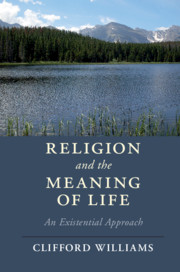Book contents
- Religion and the Meaning of Life
- Cambridge Studies in Religion, Philosophy, and Society
- Religion and the Meaning of Life
- Copyright page
- Contents
- Acknowledgments
- Introduction
- 1 Why Should We Care about Meaning?
- 2 Boredom
- 3 Denial of Death
- 4 Acquiring Meaning
- 5 Suicide
- 6 The Divine One
- 7 Life after Death
- 8 Obstacles
- 9 How Should We Live So as to Die Well?
- Epilogue Facts the Heart Can Feel
- Notes
- References
- Index
8 - Obstacles
Published online by Cambridge University Press: 23 March 2020
- Religion and the Meaning of Life
- Cambridge Studies in Religion, Philosophy, and Society
- Religion and the Meaning of Life
- Copyright page
- Contents
- Acknowledgments
- Introduction
- 1 Why Should We Care about Meaning?
- 2 Boredom
- 3 Denial of Death
- 4 Acquiring Meaning
- 5 Suicide
- 6 The Divine One
- 7 Life after Death
- 8 Obstacles
- 9 How Should We Live So as to Die Well?
- Epilogue Facts the Heart Can Feel
- Notes
- References
- Index
Summary
Chapter 8 describes four significant obstacles to acquiring meaning: unconscious motives, the lure of the crowd, dividedness, and constricted circumstances that produce suffering. The first is explained using Friedrich Nietzsche’s suspicion of the real motives of virtuous actions, the second by existentialists’ suspicion of crowds, the third by Soren Kierkegaard’s and Augustine’s idea of resistance to what is good, and the last by the constricted circumstances of women and black Americans. The realistic conclusion of the chapter is a middle ground between the debilitating pessimism of some existential writers and the easy optimism one sometimes encounters in religious people: sometimes people overcome these obstacles and sometimes they do not.
Keywords
- Type
- Chapter
- Information
- Religion and the Meaning of LifeAn Existential Approach, pp. 135 - 152Publisher: Cambridge University PressPrint publication year: 2020

